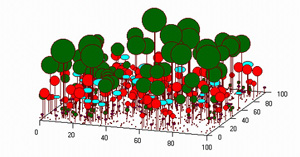"In ecological ABM (often referred to as "individual-based models" in ecology), agents may, for example, be trees in forest, and would not be considered intelligent, although they may be "purposeful" in the sense of optimizing access to a resource (such as water). The modeling process is best described as inductive. The modeler makes those assumptions thought most relevant to the situation at hand and then watches phenomena emerge from the agents' interactions. Sometimes that result is an equilibrium. Sometimes it is an emergent pattern. Sometimes, however, it is an unintelligible mangle."
Related Research:
- Ten years of individual-based modelling in ecology: what have we learned and what could we learn in the future? - by Volker Grimm(1999)
- Agent-Based Models in Ecology: Patterns and Alternative Theories of Adaptive Behaviour - by Volker Grimm and Steven F. Railsback (2006)
- The role of agent-based models in wildlife ecology and management - by Adam J.McLane et.al. (2011)
